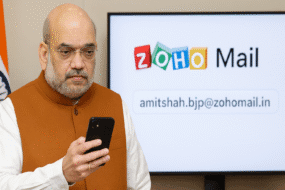The Hindu American Foundation (HAF) has issued a strong response to remarks made by Congress MP Shashi Tharoor, who questioned the Indian-American community’s silence on U.S. policies that negatively affect India.
In an opinion piece published by The Print, Suhag Shukla, co-founder and executive director of HAF, asserted that Indian-Americans are not “proxies” for India and have no obligation to act as political representatives of New Delhi in U.S. affairs.
“Just as India and Indian citizens have a duty to pursue their national interest, the United States and its citizens, including Indian Americans, have a duty to pursue ours,” Shukla wrote. “This recognition is not a betrayal of our heritage, but a simple fact of citizenship.”
Background: Tharoor’s Criticism of Diaspora Silence
Shashi Tharoor had recently pointed out what he described as a “muted” or “absent” response from the Indian-American diaspora to U.S. policies that hurt India’s interests — such as trade tariffs, visa curbs, and sanctions.
He suggested that the influential community, known for its success and political visibility in America, could use its voice more effectively to protect India’s global standing.
“As the Trump administration mounted policy assaults on India, the response from this celebrated diaspora has been muted,” Tharoor said.
Shukla’s Rebuttal: Dual Identity, Not Dual Loyalty
In her rebuttal, Suhag Shukla emphasized that Indian-Americans can hold pride in their heritage while still prioritizing their responsibilities as U.S. citizens. She called on leaders in India to understand that Indian-origin Americans engage in U.S. policymaking based on American interests and legal boundaries.
“As American citizens of Indian origin, we are in a unique position to bring nuance to one-dimensional narratives about India,” she said, stressing that the community contributes to U.S. public discourse without acting as “mouthpieces for a foreign government.”
Shukla also condemned the “dual loyalty” trope, describing it as an old stereotype often used to question the patriotism of minority communities in the U.S. She warned that such rhetoric unfairly paints Indian-Americans as “foreign agents,” undermining their civil rights.
Lobbying and Influence Disparities
Shukla pointed out that India’s lobbying presence in Washington is minimal compared to its rivals. She cited data showing that:
- Pakistan spends around $7 million annually on lobbying efforts in the U.S.,
- China invests “hundreds of millions” across industries,
- while India spends roughly $2.75 lakh per month, significantly less.
This disparity, she argued, allows anti-India groups and foreign-funded activists to dominate narratives about India in U.S. policy circles and media.
“The diaspora is not a monolith,” Shukla wrote. “A small, well-funded cohort continues to push partisan narratives critical of India, taking advantage of their alignment with legacy media.”
Indian-Americans’ Role in U.S. Politics
Despite criticisms, Shukla noted that Indian-Americans are deeply engaged in advocacy, trade, academia, and policymaking. The community has successfully worked to block anti-India sanctions and strengthen U.S.-India relations — all within the framework of U.S. law.
“We act within the bounds of American law and with no formal role in India’s policymaking,” Shukla said, adding that expecting Indian-Americans to “serve as political instruments” of India was unrealistic and unfair.
The Broader Message
Shukla concluded by reaffirming that the Indian-American community remains proud of its roots but is not defined by them in political terms.
“Indian-Americans do not exist to serve as proxies for the Government of India,” she said. “We exist as Americans — citizens endowed with rights, responsibilities, and loyalties rooted in this soil.”
Her statement underscores the ongoing tension between identity, nationality, and diaspora politics — as Indian-origin communities around the world continue to navigate their dual cultural roles in an increasingly interconnected political landscape.






One reply on “‘We Are Not Proxies for India’: Hindu American Foundation Leader Responds to Shashi Tharoor’s Remarks”
[…] Originally published on 24×7-news.com. […]